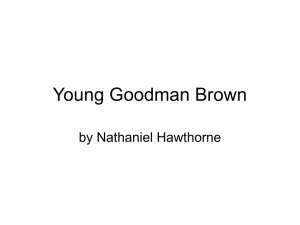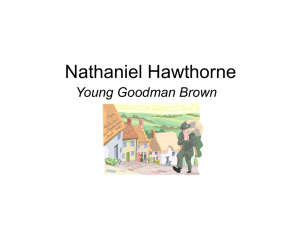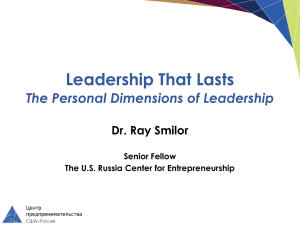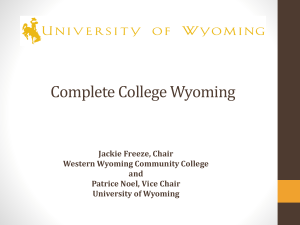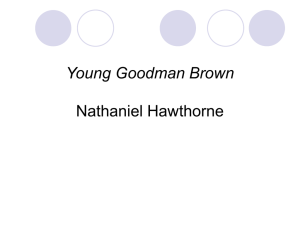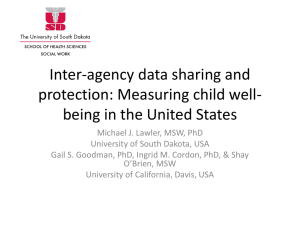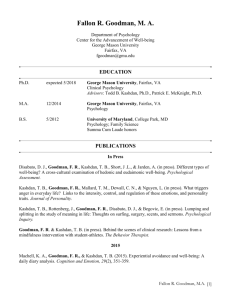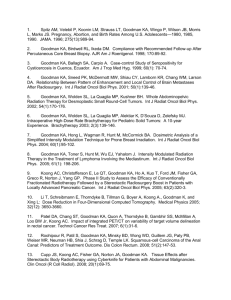The Literary Response and Analysis Strand/Cluster
advertisement
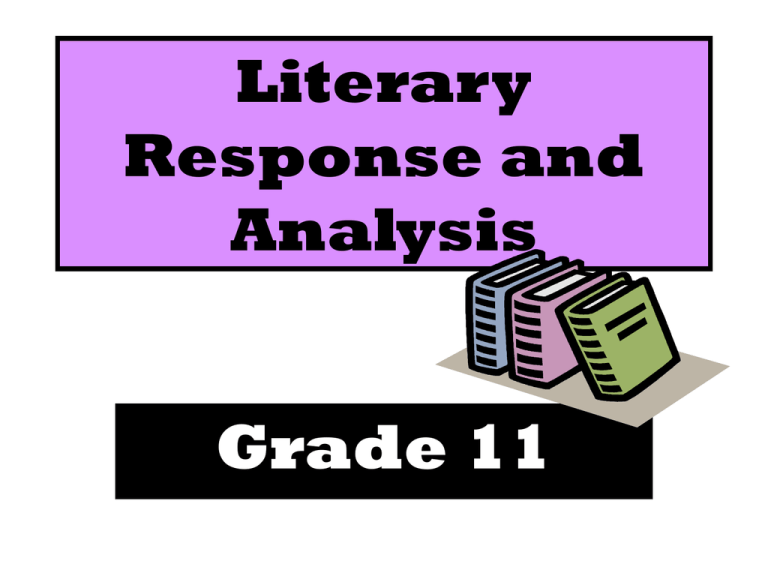
Literary Response and Analysis Grade 11 The Literary Response and Analysis Strand/Cluster The following eight California English-Language Arts content standards are included in the Literary Response and Analysis strand/cluster and are represented in this booklet by 16 test questions for grade 11. These questions represent only some ways in which these standards may be assessed on the Grade 11 California English-Language Arts Standards Test. 11RL3.0 LITERARY RESPONSE AND ANALYSIS: Students read and respond to historically or culturally significant works of literature that reflect and enhance their studies of history and social science. They conduct in-depth analyses of recurrent themes. The selections in Recommended Readings in Literature, Grades Nine Through Twelve illustrate the quality and complexity of the materials to be read by students. 11RL3.1 Structural Features of Literature: Analyze characteristics of subgenres (e.g., satire, parody, allegory, pastoral) that are used in poetry, prose, plays, novels, short stories, essays, and other basic genres. 11RL3.2 Narrative Analysis of Grade-Level-Appropriate Text: Analyze the way in which the theme or meaning of a selection represents a view or comment on life, using textual evidence to support the claim. 11RL3.3 Narrative Analysis of Grade-Level-Appropriate Text: Analyze the ways in which irony, tone, mood, the author’s style, and the “sound” of language achieve specific rhetorical or aesthetic purposes or both. 11RL3.4 Narrative Analysis of Grade-Level-Appropriate Text: Analyze ways in which poets use imagery, personification, figures of speech, and sounds to evoke readers’ emotions. 11RL3.5 Narrative Analysis of Grade-Level-Appropriate Text: Analyze recognized works of American literature representing a variety of genres and traditions: 1) Trace the development of American literature from the colonial period forward. 2) Contrast the major periods, themes, styles, and trends and describe how works by members of different cultures relate to one another in each period. 3) Evaluate the philosophical, political, religious, ethical, and social influences of the historical period that shaped the characters, plots, and settings. 11RL3.6 Narrative Analysis of Grade-Level-Appropriate Text: Analyze the way in which authors through the centuries have used archetypes drawn from myth and tradition in literature, film, political speeches, and religious writings (e.g., how the archetypes of banishment from an ideal world may be used to interpret Shakespeare’s tragedy Macbeth). 11RL3.8 Literary Criticism: Analyze the clarity and consistency of political assumptions in a selection of literary works or essays on a topic (e.g., suffrage, women’s role in organized labor) (Political approach). 11RL3.9 Literary Criticism: Analyze the philosophical arguments presented in literary works to determine whether the authors’ positions have contributed to the quality of each work and the credibility of the characters (Philosophical approach). excerpt from Young Goodman Brown by Nathaniel Hawthorne 1 Young Goodman1 Brown came forth at sunset into the street at Salem village; but put his head back, after crossing the threshold, to exchange a parting kiss with his young wife. And Faith, as the wife was aptly named, thrust her own pretty head into the street, letting the wind play with the pink ribbons on her cap while she called to Goodman Brown. 2 “Dearest heart,” whispered she, softly and rather sadly, when her lips were close to his ear, “prithee put off your journey until sunrise and sleep in your own bed to-night. A lone woman is troubled with such dreams and such thoughts that she’s afeard of herself sometimes. Pray tarry with me this night, dear husband, of all nights in the year.” 3 “My love and my Faith,” replied young Goodman Brown, “of all nights in the year, this one night must I tarry away from thee. My journey, as thou callest it, forth and back again, must needs be done ’twixt now and sunrise. What, my sweet, pretty wife, dost thou doubt me already, and we but three months married?” 4 “Then God bless you!” said Faith, with the pink ribbons; “and may you find all well when you come back.” 5 “Amen!” cried Goodman Brown. “Say thy prayers, dear Faith, and go to bed at dusk, and no harm will come to thee.” excerpt from Young Goodman Brown (continued) 6 So they parted; and the young man pursued his way until, being about to turn the corner by the meeting-house, he looked back and saw the head of Faith still peeping after him with a melancholy air, in spite of her pink ribbons. 7 “Poor little Faith!” thought he, for his heart smote him. “What a wretch am I to leave her on such an errand! She talks of dreams, too. Methought as she spoke there was trouble in her face, as if a dream had warned her what work is to be done to-night. But no, no; ’twould kill her to think it. Well, she’s a blessed angel on earth; and after this one night I’ll cling to her skirts and follow her to heaven.” 8 With this excellent resolve for the future, Goodman Brown felt himself justified in making more haste on his present evil purpose. He had taken a dreary road, darkened by all the gloomiest trees of the forest, which barely stood aside to let the narrow path creep through, and closed immediately behind. It was all as lonely as could be; and there is this peculiarity in such a solitude, that the traveller knows not who may be concealed by the innumerable trunks and the thick boughs overhead; so that with lonely footsteps he may yet be passing through an unseen multitude. 9 “There may be an Indian behind every tree,” said Goodman Brown to himself; and he glanced fearfully behind him as he added, “What if the devil himself should be at my very elbow!” excerpt from Young Goodman Brown (continued) 10 His head being turned back, he passed a crook of the road, and, looking forward again, beheld the figure of a man, in grave and decent attire, seated at the foot of an old tree. He arose at Goodman Brown’s approach and walked onward side by side with him. 11 “You are late, Goodman Brown,” said he. “The clock of the Old South was striking as I came through Boston, and that is full fifteen minutes agone.” 12 “Faith kept me back a while,” replied the young man, with a tremor in his voice, caused by the sudden appearance of his companion, though not wholly unexpected. During the Colonial period, the forest embodied all that was evil, including the unknown. This is most apparent in which of the following paragraphs? A B C D 1 and 2 6 and 7 8 and 9 11 and 12 11RL3.5.3 In the final paragraph, Goodman Brown tells the man he meets in the woods that “Faith kept me back a while.” Literally, he means that his wife made him late. What other meaning could this remark have had? A B C D His religious faith almost kept him from the journey. His faith in his marriage was more important than the journey. Faith is necessary to complete the things one is required to do. The remark could have no meaning beyond the literal one. 11RL3.1 This excerpt suggests that all people must, at some time, choose between good and evil. All of the following contribute to the reader’s perception that Goodman Brown knows that he is about to embrace evil except A B C D paragraph 3, Goodman Brown says, “. . . of all nights in the year, this one night must I tarry away from thee.” paragraph 7, Goodman Brown thinks, “. . . [it was] as if a dream had warned her what work is to be done to-night.” paragraph 8, “. . . Goodman Brown felt himself justified in making more haste on his present evil purpose.” paragraph 1, “Young Goodman Brown came forth at sunset into the street at Salem village . . .” 11RL3.2 This excerpt suggests that Hawthorne’s philosophical position includes which one of the following ideas? A B C D Man is predisposed to do evil. Man’s first impulse is to do good. Man creates his own reality. Man is responsible for his actions. 11RL3.0 The Solace of Open Spaces by Gretel Ehrlich 1 It’s May and I’ve just awakened from a nap, curled against sagebrush the way my dog taught me to sleep—sheltered from wind. A front is pulling the huge sky over me, and from the dark a hailstone has hit me on the head. I’m trailing a band of two thousand sheep across a stretch of Wyoming badlands, a fifty-mile trip that takes five days because sheep shade up in hot sun and won’t budge until it’s cool. Bunched together now, and excited into a run by the storm, they drift across dry land, tumbling into draws1 like water, and surge out again onto the rugged, choppy plateaus that are the building blocks of this state. 2 The name Wyoming comes from an Indian word meaning “at the great plains,” but the plains are really valleys, great arid valleys, sixteen hundred square miles, with the horizon bending up on all sides into mountain ranges. This gives the vastness a sheltering look. The Solace of Open Spaces (continued) 3 Winter lasts six months here. Prevailing winds spill snowdrifts to the east, and new storms from the northwest replenish them. This white bulk is sometimes dizzying, even nauseating, to look at. At twenty, thirty, and forty degrees below zero, not only does your car not work, but neither do your mind and body. The landscape hardens into a dungeon of space. During the winter, while I was riding to find a new calf, my jeans froze to the saddle, and in the silence that such cold creates I felt like the first person on earth, or the last. 4 Today the sun is out—only a few clouds billowing. In the east, where the sheep have started off without me, the benchland tilts up in a series of eroded red-earthed mesas, planed flat on top by a million years of water; behind them, a bold line of muscular scarps rears up ten thousand feet to become the Big Horn Mountains. A tidal pattern is engraved into the ground, as if left by the sea that once covered this state. Canyons curve down like galaxies to meet the oncoming rush of flat land. 5 To live and work in this kind of open country, with its hundred-mile views, is to lose the distinction between background and foreground. When I asked an older ranch hand to describe Wyoming’s openness, he said, “It’s all a bunch of nothing—wind and rattlesnakes—and so much of it you can’t tell where you’re going or where you’ve been, and it don’t make much difference.” John, a sheepman I know, is tall and handsome and has an explosive temperament. He has a perfect intuition about people and sheep. They call him “Highpockets,” because he’s so long-legged; his graceful stride matches the distances he has to cover. He says, “Open space hasn’t affected me at all. It’s all the people moving in on it.” The huge ranch he was born on takes up much of one county and spreads into another state; to put 100,000 miles on his pickup in three The Solace of Open Spaces (continued) years and never leave home is not unusual. A friend of mine has an aunt who ranched on Powder River and didn’t go off her place for eleven years. When her husband died, she quickly moved to town, bought a car, and drove around the States to see what she’d been missing. 6 Most people tell me they’ve simply driven through Wyoming, as if there were nothing to stop for. Or else they’ve skied in Jackson Hole, a place Wyomingites acknowledge uncomfortably because its green beauty and chic affluence are mismatched with the rest of the state. Most of Wyoming has a “lean-to” look. Instead of big, roomy barns and Victorian houses, there are dugouts, low sheds, log cabins, sheep camps, and fence lines that look like driftwood blown haphazardly into place. People here still feel pride because they live in such a harsh place, part of the glamorous cowboy past, and they are determined not to be the victims of a mining-dominated future. 7 Most characteristic of the state’s landscape is what a developer euphemistically describes as “indigenous growth right up to your front door”—a reference to waterless stands of salt sage, snakes, jack rabbits, deerflies, red dust, a brief respite of wildflowers, dry washes, and no trees. In the Great Plains the vistas look like music, like Kyries2 of grass, but Wyoming seems to be the doing of a mad architect— tumbled and twisted, ribboned with faded, deathbed colors, thrust up and pulled down as if the place had been startled out of a deep sleep and thrown into a pure light. To which literary subgenre is this passage most closely related? A B C D parody allegory satire pastoral 11RL3.1 In paragraph 5, the author mainly uses quotations by Wyoming residents to A B C D invite the reader to identify with people from Wyoming. enhance the clarity of the passage. explain how she slowly came to appreciate Wyoming. illustrate the relationship between Wyoming and its people. 11RL3.2 Read this excerpt from the passage. People here . . . are determined not to be the victims of a mining-dominated future. This statement reveals the author’s belief that A B C D people are foolish for resisting inevitable changes. profits from the mines should be used for the benefit of the state. mining could potentially threaten the ranching way of life. Wyoming is in danger of pollution caused by mining. 11RL3.8 Which philosophical point does the author make in the passage? A B C D Hard work is the purpose of life. People are shaped by their environment. Practical skills are more important than formal education. People were never meant to live in large groups. 11RL3.9 adapted from The Art of Optimism by William De Witt Hyde, LL.D. 1 The world we live in is a world of mingled good and evil. Whether it is chiefly good or chiefly bad depends on how we take it. To look at the world in such a way as to emphasize the evil is the art of pessimism. To look at it in such a way as to bring out the good, and throw the evil into the background, is the art of optimism. The facts are the same in either case. It is simply a question of perspective and emphasis. Whether we shall be optimists or pessimists depends partly on temperament, but chiefly on will. If you are happy it is largely to your own credit. If you are miserable it is chiefly your own fault. I propose to show you both pessimism and optimism, give a prescription for each, and leave you to take whichever you like best: for whether you are a pessimist or an optimist doesn’t depend on whether the world is wholly good or wholly bad, or whether you have a hard lot or an easy one. It depends on what you like, and what you want and what you resolve to be. Perchance you are the most fortunate and happy person among my hearers. There are thousands of people who would be miserable were they situated precisely as you are. They would make themselves miserable because that is their temperament; that is their way of looking at things. And even in your happy and enviable condition, with all your health and wealth, and hosts of friends, and abundance of interests, they would find plenty of stuff to make their misery out of. On the other hand, you may be the person of all others among my hearers who has the hardest time, who has lost dearest friends, who has the severest struggle with poverty, who has worst enemies, who meets cruelest unkindness, who seems to have least to live for. Thousands of people would be supremely happy if they were in precisely your circumstances. Life is like the ocean. It drowns one man, because he yields to it passively and blindly. It buoys up the other because he strikes it skillfully, and buffets it with lusty sinews. adapted from The Art of Optimism (completed) 2 There is enough that is bad in every life to make one miserable who is so inclined. We all know people who have plenty to eat, a roof over their heads, a soft bed to lie in, money in the bank to cover all probable needs for the rest of their days, plenty of friends, good social position, an unbroken family circle, good education, even the profession of some sort of religion; who yet by magnifying something that happened to them a long while ago; or something that may happen to them at some time to come; or what somebody has said about them; or the work they have to do; or the slight someone has shown them, or even without anything as definite as even these trifles, contrive to make themselves and everybody else perpetually wretched and uncomfortable. These people have acquired the art of pessimism. 3 Practically, anybody can be a pessimist who wants to. The art is easily acquired. Here are the rules for it. 4 Live in the passive voice, intent on what you can get, rather than on what you can do. In the subjunctive mood, meditate on what might be, rather than what actually is. In the past or future tense, either harp on what has been, or worry about what will be, rather than facing the facts of the present. In the third person, find fault with other people instead of setting your own affairs in order. In the plural number, follow the standards of respectability of other people rather than your own perception of what is fit and proper. adapted from The Art of Optimism (completed) 5 Keep these rules faithfully, always measuring the worth of life in terms of personal pleasure, rather than in terms of growth of character or service of high ends, and you will be a pessimist before you know it. For pessimism is the logical and inevitable outcome of that way of looking at life. 6 A sound optimism accepts with open eyes all the hard facts on which pessimism builds. Enjoyment is fleeting. Nothing can permanently satisfy us. As Browning said to an artist who complained that he was so dissatisfied with what he had done, “But think, if you were satisfied, how little you would be satisfied with!” Optimism proclaims this very incapacity of ours to be satisfied with anything finite, the glory of our nature, the promise and potency of our progress and development, the assurance of our immortality. If good is a satisfied feeling, which is to be given to us ready-made, then indeed we shall never get it, and pessimism is the ultimate truth. If good is a state of eager and enthusiastic activity of will, then this world of ours is just the best place imaginable to give field for this activity. 7 Having given rules for the art of pessimism, I suppose I ought to be equally explicit in regard to optimism. I will here again adopt the easily rememberable form in which the rules for pessimism were cast. Indeed, the rules for optimism are simply the inverse of the rules for pessimism. adapted from The Art of Optimism (completed) 8 Live in the active voice, intent on what you can do rather than on what happens to you. In the indicative mood, be concerned with facts as they are rather than as they might be. In the present tense, concentrate on the duty at hand, without regret for the past or worry about the future. In the first person, criticize yourself rather than condemning others. In the singular number, seek the approval of your own conscience rather than popularity with the many. Whoever lives the life of such unselfish devotion to the good of others and of all, and lives it in the active voice, indicative mood, present tense, first person, singular number, is bound to find his life full and rich and glad and free; is bound, in other words, to be an optimist. The Pursuit of Happiness by Charles Dudley Warner 1 Perhaps the most curious and interesting phrase ever put into a public document is “the pursuit of happiness.” It is declared to be an inalienable right. It cannot be sold. It cannot be given away. It is doubtful if it can be left by will. The right of every man to be six feet high and of every woman to be five feet four was regarded as self-evident, until women asserted their undoubted right to be six feet high also, when some confusion was introduced into the interpretation of this rhetorical fragment of the eighteenth century. 2 The pursuit of happiness! It is not strange that men call it an illusion. But I am satisfied that it is not the thing itself, but the pursuit, that is an illusion. Instead of thinking of the pursuit, why not fix our thoughts upon the moments, the hours, perhaps the days, of this divine peace, this merriment of body and mind, that can be repeated, and perhaps indefinitely extended by the simplest of all means, namely, the disposition to make the best of whatever comes to us? Perhaps the Latin poet was right in saying that no man can count himself happy while in this life, that is, in a continuous state of happiness; but as there is for the soul no time save the conscious moment called “now,” it is quite possible to make that “now” a happy state of existence. The point I make is that we should not habitually postpone that season of happiness to the future. The Pursuit of Happiness by Charles Dudley Warner 3 Sometimes wandering in a primeval forest, in all the witchery of the woods, besought by the kindliest solicitations of nature, wild flowers in the trail, the call of the squirrel, the flutter of the bird, the great worldmusic of the wind in the pine-tops, the flecks of sunlight on the brown carpet and on the rough bark of the immemorial trees, I find myself unconsciously postponing my enjoyment until I shall reach a hoped-for open place of full sun and boundless prospect. 4 The analogy cannot be pushed, for it is the common experience that these open spots in life, where leisure and space and contentment await us, are usually grown up with thickets, fuller of obstacles, to say nothing of the labors and duties and difficulties, than any part of the weary path we have trod. 5 The pitiful part of this inalienable right to the pursuit of happiness is, however, that most men interpret it to mean the pursuit of wealth, and strive for that always, postponing being happy until they get a fortune, and if they are lucky in that, find in the end that the happiness has somehow eluded them, that, in short, they have not cultivated that in themselves which alone can bring happiness. More than that, they have lost the power of the enjoyment of the essential pleasures of life. I think that the woman in the Scriptures who out of her poverty put her mite into the contribution-box got more happiness out of that driblet of generosity and selfsacrifice than some men in our day have experienced in founding a university. Both “The Art of Optimism” and “The Pursuit of Happiness” are best classified as A B C D political speeches. informal speeches. acceptance speeches. persuasive speeches. 11RL3.1 Both Hyde and Warner advise their listeners to A B C D give money to charities. attend to their duties. spend time in nature. live in the present. 11RL3.9 The Wood-Pile by Robert Frost (1874–1963) Out walking in the frozen swamp one grey day I paused and said, “I will turn back from here. No, I will go on farther––and we shall see. ”The hard snow held me, save where now and then 5 One foot went down. The view was all in lines Straight up and down of tall slim trees Too much alike to mark or name a place by So as to say for certain I was here Or somewhere else: I was just far from home. 10 A small bird flew before me. He was careful To put a tree between us when he lighted, And say no word to tell me who he was Who was so foolish as to think what he thought. He thought that I was after him for a feather–– The Wood-Pile (continued) 15 The white one in his tail; like one who takes Everything said as personal to himself. One flight out sideways would have undeceived him. And then there was a pile of wood for which I forgot him and let his little fear 20 Carry him off the way I might have gone, Without so much as wishing him good-night. He went behind it to make his last stand. It was a cord of maple, cut and split And piled––and measured, four by four by eight. 25 And not another like it could I see. No runner tracks in this year’s snow looped near it. And it was older sure than this year’s cutting, Or even last year’s or the year’s before. The wood was grey and the bark warping off it The Wood-Pile (continued) 30 And the pile somewhat sunken. Clematis1 Had wound strings round and round it like a bundle. What held it though on one side was a tree Still growing, and on one a stake and prop, These latter about to fall. I thought that only 35 Someone who lived in turning to fresh tasks Could so forget his handiwork on which He spent himself, the labour of his axe, And leave it there far from a useful fireplace To warm the frozen swamp as best it could 40 With the slow smokeless burning of decay. In line 35, when the poet mentions “Someone who lived in turning to fresh tasks,” he is referring to a person who A B C D likes things to be organized. rarely completes his projects. dislikes hard work. feels at home in the outdoors. 11RL3.4 What is ironic about the winter setting of the poem? A B C D Animals cannot make use of the wood because they are hibernating. The wood could be keeping someone warm, but instead it is rotting in the swamp. The speaker would not have noticed the wood-pile if the trees had not been bare. The person who cut the wood wanted to come back to it, but the snow hid his tracks. 11RL3.3 One feature of this poem that classifies it as modern American poetry, rather than poetry of the Colonial period, is that A B C D it is not strongly moralistic or religious. it has only one main character. it provides a description of nature. it lends itself to various interpretations. 11RL3.5.2 Robert Frost wrote and published from 1894 until his death in 1963. What literary trend of Frost’s era can be found in this poem? A B C D focus on everyday things intricate rhyme schemes instances of dialogue dramatic ending 11RL3.5.3 Grinning the Bark off a Tree by Davy Crockett (1786–1836) 1 That Colonel Crockett could avail himself, in electioneering, of the advantages which well-applied satire ensures, the following anecdote will sufficiently prove. 2 In the canvass of the Congressional election of 18__, Mr. ***** was the Colonel’s opponent—a gentleman of the most pleasing and conciliating manners—who seldom addressed a person or a company without wearing upon his countenance a peculiarly good-humored smile. The Colonel, to counteract the influence of this winning attribute, thus alluded to it in a stump speech. Grinning the Bark off a Tree (continued) 3 “Yes, gentlemen, he may get some votes by grinning, for he can outgrin me—and you know I ain’t slow— and to prove to you that I am not, I will tell you an anecdote. I was concerned myself—and I was fooled. You all know I love hunting. Well, I discovered a long time ago that a raccoon couldn’t stand my grin. I could bring one tumbling down from the highest tree. I never wasted powder and lead when I wanted one of the creatures. Well, as I was walking out one night, a few hundred yards from my house, looking carelessly about me, I saw a raccoon planted upon one of the highest limbs of an old tree. The night was very moony and clear, and old Rattler was with me; but Rattler won’t bark at a raccoon—he’s a strange dog in that way. So, I thought I’d bring the lark down in the usual way, by a grin. I set myself—and, after grinning at the raccoon a reasonable time, found that he didn’t come down. I wondered what was the reason—and I took another steady grin at him. Still he was there. It made me a little mad; so I felt round and got an old limb about five feet long, and, planting one end upon the ground, I placed my chin upon the other, and took a rest. I then grinned my best for Grinning the Bark off a Tree (continued) about five minutes; but the cursed raccoon hung on. So, finding I could not bring him down by grinning, I determined to have him—for I thought he must be a droll chap. I went over to the house, got my axe, returned to the tree, saw the raccoon still there, and began to cut away. Down it come, and I ran forward; but nary a raccoon was there to be seen. I found that what I had taken for one, was a large knot upon the branch of the tree and, upon looking at it closely, I saw that I had grinned all the bark off, and left the knot perfectly smooth. “Now, fellow-citizens,” continued the Colonel, “you must be convinced that, in the grinning line, I myself am not slow—yet, when I look upon my opponent’s countenance, I must admit that he is my superior. You must all admit it. Therefore, be wide awake—look sharp—and do not let him grin you out of your votes.” Colonel Crockett draws from which of the following archetypes in his portrayal of his opponent? A B C D rebel hero trickster scapegoat 11RL3.6 What political system is reflected in the passage? A B C D democracy socialism communism theocracy 11RL3.8
